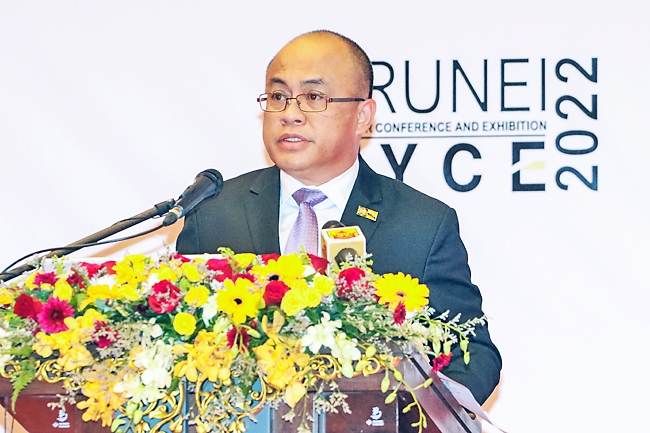Izah Azahari
“Agrotechnology plays a cardinal role in the development of the agricultural industry,” Minister of Primary Resources and Tourism Dato Seri Paduka Dr Haji Abdul Manaf bin Haji Metussin highlighted at the Borneo International Conference on Agrotechnology (BICAT) 2022 yesterday.
Themed ‘Technology for Agriculture 4.0’, the conference was held at the International Convention Centre (ICC) in Berakas.
Agrotechnology can yield countless benefits including increased productivity and output; ensuring agriculture is sustainable, profitable, efficient, safe and environmentally friendly; producing cost effective, quality and nutritious food; and improving food security for the growing population.
“The Ministry of Primary Resources and Tourism (MPRT) has long acknowledged the importance technology plays in this field, as per the vision and mission statement of the MPRT Strategic Plan,” he said.
The strategic plan serves as a guide in the planning and implementation of various MPRT programmes and initiatives, and is designed to increase production and contribute significantly to the growth and diversification of the national gross domestic production. Methods identified to achieve this include agrotechnology and encouraging the involvement of local and foreign direct investments.


The minister pointed out that the last decade had witnessed substantial growth in global agriculture technology investments, with major innovations in the areas of indoor vertical farming; automation and robotics; livestock technology; modern greenhouse practices; precision farming and artificial intelligence, and blockchain management.
“Technology utilisation in our agriculture and fisheries sectors has shown a positive uptake over the past five years, with the ministry continuing to encourage its use to further increase farm production and productivity,” Dato Seri Paduka Dr Haji Abdul Manaf said.
The Sultanate has in its arsenal indoor hydroponics and vertical farming from growing high value vegetables – to allow maximum usage of space and produce higher yields; greenhouses with automated fertigation system to grow melons; greenhouses with automated temperature control system in the horticulture nursery farm – to provide reliable temperature options to ensure greenhouses consistently operate at an optimum level; hydroponics and vertical farming in greenhouses with smart farming technology using Internet of Things (IoT) to produce high value vegetables; closed-house systems currently being used by most of our poultry farm operators for better isolation, equipped with a temperature and humidity control system to improve productivity.
Meanwhile, the aquaculture industry boasts the recirculating aquaculture systems (RAS) hatchery and nursery to allow fish to be farmed in net cages or tanks instead of open-air ponds. The systems allow high-density production within a breeding environment that is controllable by the operator, the minister explained.
“Working as a farmer today no longer necessarily means having to toil under the sun. The use of technology and modern farming techniques make business opportunities in agriculture, including aquaculture, more appealing. Hopefully this entices more locals, particular youths, to get on board,” Dato Seri Paduka Dr Haji Abdul Manaf said.
Technological use has undoubtedly allowed for better harvests.
“Through the introduction of a high-yielding hybrid rice variety (Sembada 188) in 2019, we have been able to almost double our paddy production, going from 2,308 metric tonnes (MT) in 2019 to 4,115MT in 2021, a 34 per cent increase per annum. As such, the rice self-sufficiency level has also increased from 4.8 per cent in 2019 to 9.11 per cent in 2021.
“In the crop industry, the introduction of Japanese Musk Melon – produced in greenhouse with automated fertigation system in 2019 – has enabled an increase in export production from 25MT in 2019 to 211MT in 2021.
“In the aquaculture industry, the 2019 introduction of Vannamei shrimp species allowed for increase shrimp production from our farms, moving from 591MT (valued at BND5.51 million) in 2019 to 4,481MT (valued at BND38 million) in 2021,” Dato Seri Paduka Dr Haji Abdul Manaf said.
“I hope more entrepreneurs and farmers who are yet to adopt the use of technology, as well as interested parties will come forward to explore these opportunities,” he said.
Despite the COVID-19 outbreak, the agriculture and fisheries sectors have recorded positive growth over the past two years, with overall gross output of agriculture and agrifood industry seeing an increase at an average rate of 17.1 per cent per annum – from BND428 million in 2019 to BND587 million in 2021.
The fisheries industry alone increased at an average rate of 38.2 per cent per annum from BND100 million in 2019 to BND191 million in 2021.
The minister said the Department of Agriculture and Agrifood as well as the Fisheries Department will continue to identify new strategies and initiatives to ensure annual output by these sectors can expand, and contribute significantly towards the growth and diversification of gross domestic product (GDP), thereby supporting the objectives of Brunei Vision 2035 and food security agenda.






